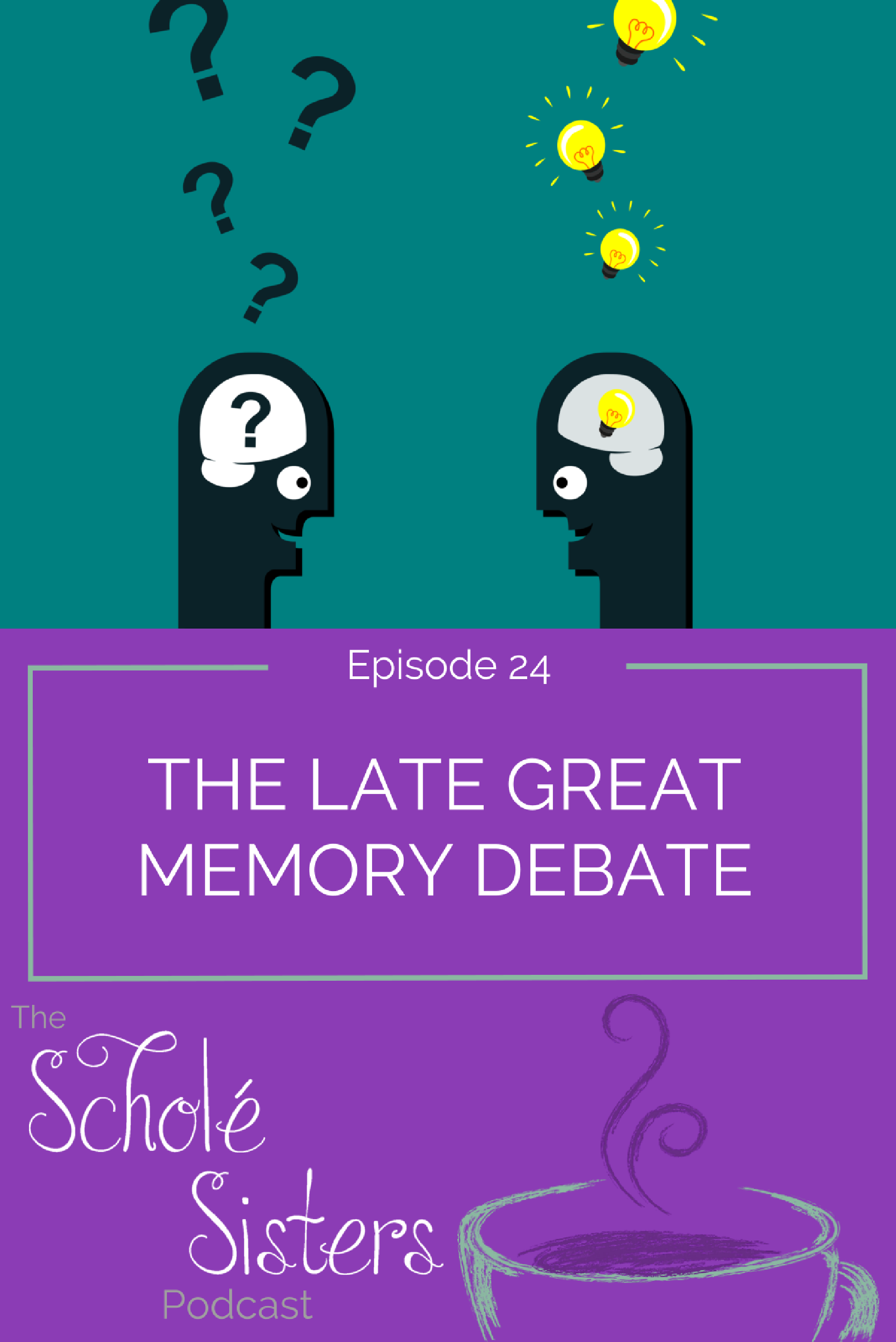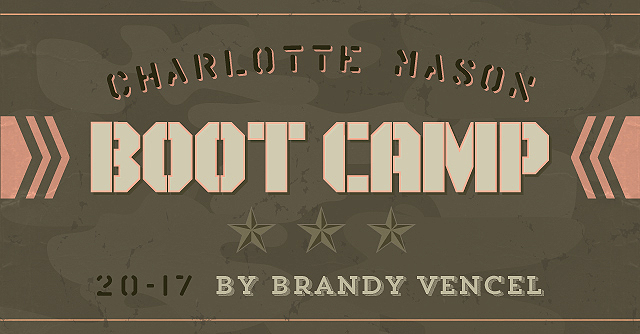SS #24: The Late Great Memory Debate
This summer, we shared an article from The Atlantic on memorization, and WOW did the discussion explode on Facebook! We couldn’t help chatting about it ourselves, and that conversation eventually became this podcast episode.
We don’t pretend to have the last word on memory work, but we do think this is a great beginning place to start thinking about this issue.

Thank you to our sponsor:
This episode is sponsored by Charlotte Mason Boot Camp. Want to whip those Charlotte Mason muscles into shape? The intense, 6-week Charlotte Mason Boot Camp does just that! It’ll take that philosophical flab and turn it into nothing less than confidence. It’ll give you all the growing, stretching, and strengthening you’ve been looking for. Charlotte Mason Boot Camp fills up fast. To get on the interest list, click here and sign up!
Listen to the podcast:
Podcast: Play in new window | Download
Show Notes:
- Scholé RDA:
- Mental Multivitamin — we can’t link to this blog because it no longer exists, but we wanted you to know what we were saying. 🙂
- Pam
The Lost Book of the Grail by Charlie Lovett
- Modern Mrs. Darcy Summer Reading List
- Mystie
Dawn to Decadence by Jacques Barzun
- Amber Vanderpol
A History of the American People by Paul Johnson — audio book
- Brandy
The Roots of American Order by Russell Kirk
Against the Gods by John Currid
- Yes, Brandy really did invent the word “symbolistic” while we were recording
- Topical Discussion: The Late Great Memory Debate
- The article we shared on FB that started it all: When Memorization Gets in the Way of Learning from The Atlantic
- CC timeline song with Veritas Cards
- New CC timeline song
- GHC Ontario
- Here’s a quote:
They cram to pass, and not to know, they do pass, and they don’t know. — John Ruskin
- Facts and ideas episode from Your Morning Basket Podcast — Teaching with Ideas: A Conversation with Brandy Vencel
- Math U See
- Research on the Teaching of Math: Formal Arithmetic at Age Ten, Hurried or Delayed? by Harvey Bluedorn
Better Late Than Early by Raymond and Dorothy Moore
- Scholé Sisters Episode 13: Learning Styles are Bunk
- Nitty Gritty Homeschool Question
- Children’s Catechism
- Grounded: The Physics of Circle Time
- Why Slow Reading Matters More Than You’d Expect by Brandy Vencel
Pride and Prejudice by Jane Austen
Count of Monte Cristo
by Alexandre DumasThe Lord of the Rings Trilogy by JRR Tolkien
- AmblesideOnline
Please leave us a review in iTunes!
If you don’t know how to do that, click here for illustrated instructions.
Want to ask an upcoming Nitty Gritty Homeschool Question?
We now have two options! Go fill out this handy little form OR leave a voicemail and your question might be featured on a future episode of the show!












Does CM discuss making a multiplication table in one of her volumes? My oldest is resisting memorizing tables and it’s slowing him down in pre-algebra.
I really enjoyed this! One of the most balanced discussions on the memorizing debate that I’ve heard.
If you haven’t come across it yet, I love Wes Callihan’s article on slow reading–“Eating Books.”
http://scholatutorials.org/scholegium/scholegium2_18.html#COGITEM
Have you tried xtramath? Instead of straight table memory (which we’ve also done), you memorize by repeatedly *doing* the math. I’ve made moving on or having certain privileges again tied to passing xtramath levels when extra motivation is needed. 😉
We’ve just started back in on xtra math practice. But I think a screen time reward might be a good incentive. He is just ‘naturally’ good at math (always has been able to do large sums in his head and complex logic puzzles) so it hasn’t been a huge hinderance so far. Thanks for the suggestion.
Thanks for this… and I was so excited to hear you were answering my question! ! Especially since I now realize I had really no idea what you meant by slow reading, haha… but now I have some ideas. (Oh, and actually my husband is working through LOTR with the kids – they already did the Hobbit – so they are getting a nice slow pace for that too!)
I can’t seem to find my way back to Abby who asked if anyone else was reading “The Roots of American Order.” If you see this, Abby, I asked my Mom at the Russell Kirk Center for Cultural Renewal about that study guide and she said that it’s being revised and will be up on the center’s website in January as a free download. Happy reading!
Thanks, Andrea!
I heard Cindy Rollins talk about using the Michael Clay Thompson books in Morning Time for grammar. Has anyone else tried this? We tend to take whatever part of speech is in our CC memory work and make up silly sentences that use that and briefly diagram them. We’ve also read Grammar-Land by M.L. Nesbitt in Morning Time, which is hilarious.
Thank you for discussing slow reading! I was just starting to feel some anxiety about the time we’ve spent with The Three Musketeers and how we may not get to another book this semester.
I started doing this a couple years ago after Cindy explained it, yes! I wrote about it here, if you want to check it out.
I keep meaning to read Grammar-Land…
In John Miedema’s book titled Slow Reading, he discusses why and how to read slowly. (Have you read this Brandy?) His point is that some books are worth reading slowly in order to meditate and fully understand what they are saying. Other books should be read quickly because they are more shallow and don’t really reward that kind of sustained attention.
If you want more info on slow reading, I found it to be a really enjoyable book. Here is the link to Miedema’s book on amazon: http://a.co/0eb9cnv
This discussion also made me think of Eat this book : a conversation in the art of spiritual reading by Eugene H. Peterson. Books we dwell on at length become part of us.
I haven’t heard of either of those books! Thank you! I am putting both of them on my wishlist … ♥ I love that: “Books we dwell on at length become part of us.”
I am one of those unicorn people who doesn’t have a lot of trouble reconciling the Classical and CM approaches. Most of our memorization at home is of beautiful things: poetry, scripture, literature, hymns. Familiarity with drier facts usually suffices to spur conversation and also suits my lazy bones! So…I often find that CM purists mischaracterize Classical education in its modern revival idiom. (I was introduced to CM when I, as a classical educator, was explaining how I always sought out poetic, gorgeously illustrated biographies and read novels aloud constantly, and was told “you might be Charlotte Mason….”) But the refrain in all Classical Conversations material in particular is constantly emphasizing the meaninglessness of grammar without dialectic, the primacy of goodness, beauty and truth, and literature and play as the main tutors of littles. My own process is a clumsy amalgamation steeped in words-words-words! But I just wanted to add that although you ladies often make laughing allusions (I assume) to CC, most well-read Classical tutors would agree with almost everything you conclude in this conversation and own it as essentially part and parcel with modern Classical approaches as well as CM. Thanks, girls. Love this podcast.
Hi Elizabeth! Brandy is actually the only one of us three who is all-in on CM. I came into educational philosophy through the classical conversation (ha!), and love CM as one way to apply what I think are her classical values and virtues of education. I agree that many in a CM-only world misunderstand classical.
I think it’s unfortunate if any of our jokes (and we laugh at ourselves as much as anyone!) appear to be slighting a particular group – we keep them non-specific because we want to address a mindset, not a program. The facts-drill mindset can be found outside the neoclassical approach and outside CC, and I’ve seen CC applications that are about contextualizing the memory work and loving TGB, too.
We hope to stimulate thought and conversation, and poke only at complacencies and anyone who thinks education can be found in following a formula rather than loving life and learning for its own sake.
Thanks for adding to that conversation!